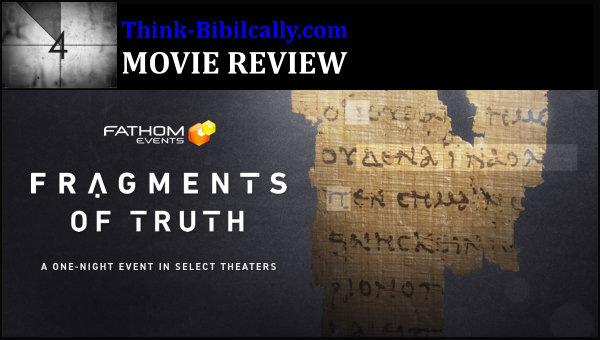By Tyson Thorne

I'm just home from a one-night event. the showing of a documentary titled Fragments of Truth by Faithlife Films. The script was put together by Dr. Craig Evans, professor at Houston Baptist Seminary and whom appears in the film frequently. The narration, however, was performed by none other than John Rhys-Davies — also known as Gimli in The Lord of the Rings or as Indiana Jones' friend Sallah. This movie can be considered an apologetic discussing the reliability of the Bible we hold in our hands today, and as such it does a fine job.
The occasion for this film is a relatively new understanding of the life of parchments, papyrus and codices throughout history. One criticism some have held against Christianity is that we do not have the original copies of the books of the Bible. Since that is true, we cannot know with certainty that the text we have today accurately reflects the writings of the original authors. In the recent past Christian scholars have argued that we have many manuscripts that date within 200 years of the autograph copies and fragments of it dating to within 70 or 90 years of the original writing.
The new understanding of the use of particularly New Testament documents is that each manuscript had a life not of twenty to forty years, but of two- to three hundred years! Creating a copy of, say, Luke's gospel was an expensive undertaking. First, the materials used to create the copy were costly, then it required a talented scribe to pen the copy, and then to check the work for errors. Along with the cost, it was a time consuming process. Add to the fact that the work is considered sacred text, and you have a manuscript that is well cared for and passed down from one generation to the next. As a result, we can now show that many manuscripts were used for centuries rather than decades.
What difference does this make? It means that those copies of New Testament writing that were created a couple hundred years after the original date of authorship could be direct copies of the original! If they are not second generation copies then they are at most third generation, meaning there is really very little chance of corruption entering the text. This truth destroys the arguments made against the New Testament by critics like Bart Ehrman.
The film would be very short indeed if this were all it presented, so it does a very good job of talking about the issues around this discovery. I admit that I was a little proud of the fact that nothing else presented in the film will be a surprise to regular readers of Think-Biblically.com. In fact, not only have we covered the rest of the film but have actually gone a bit further in our research than they had in some cases. That said, I compliment the producer of the film for telling the story through vivid imagery and well designed information graphics, and for the compelling interviews with the people who know ancient manuscripts better than anyone else alive today.
My only criticism of the film would be in it's presentation of the materials. There was no clear path to the explanation and the eventual revelation of the dramatic discovery. Probably the best documentary in this regard is Patterns of Evidence: The Exodus (which we also reviewed and highly praised). This is not to say that any part of the film was confusing or appeared out of place, only that better organization would have made a more exciting and compelling story. Think-Biblically.com still recommends Fragments of Truth for anyone interested in understanding the process of reproduction of the New Testament and any who want to defend their faith from such arguments.
